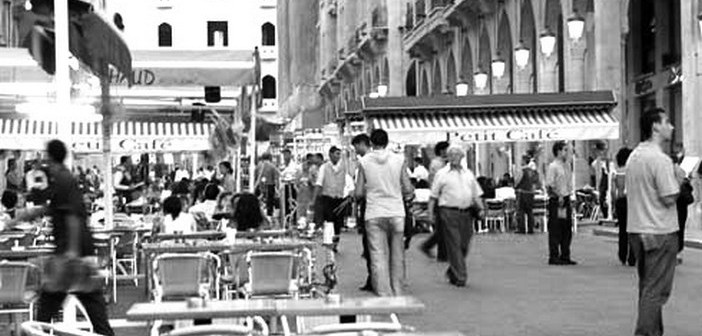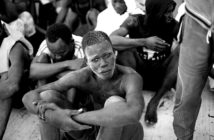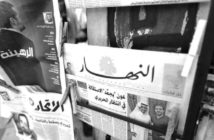Small states, unlike great powers cannot independently span the structure of the international system. Hence, great powers are the ones responsible for maintaining the world order. This dependency exists due to the lack of capabilities in terms of population and territorial size, economic wealth and military expenditure. However, many small states in Europe were able to prosper despite their relatively small size and were able to make their voice heard in the international fora. Nordic states like Finland, Denmark, Sweden, Norway and Iceland, are a lead example on how small states can adopt smart strategies to survive within Europe and can be called “welfare states”. In the case of Lebanon, this success is not within reach simply because, contrarily to European countries, Lebanon’s political, economic and social structures are shaped by a sectarian divide that constitutes a barrier for the creation of a true national identity.
ملخّص
تعجز الدول الصغيرة وبعكس الدول الكبرى عن التأثير في مسار وتركيبة النظام الدولي فتتولى هذه الأخيرة دور الحفاظ على النظام العالمي. ويعود هذا العجز إلى النقص في الإمكانيات علماً أن الدول الصغيرة تتميز بعدد سكّان ضئيل ومساحة محدودة واقتصاد ركيك وميزانية عسكرية منخفضة جداّ. لكن هذه الحقيقة ليست بمطلقة لا سيّما أن الدول الأوروبية الصغيرة مثل الدول السكاندينافية قد استفادت من صغر حجمها لكي تبين عن قوّة أخرى وهي القوة الإقتصادية فأمّنت لشعبها الرفاهة الإجتماعية. أمّا في ما يتعلّق بلبنانوبعكس الدول الأوروبية الصغيرة التي علمت كيف تحوّل ضعفها إلى قوّة عظمة على المستوى العالمي ، فإن حالة لبنان السياسية والإقتصادية والإجتماعية تديرها الحزازيات الدينية التي تشكّل عائقاٌ أمام تشكيل وحدة وطنيّة.
According to Steinmetz and Wivel, being a small state is tied to a specific spatiotemporal context and that this context rather than general characteristics of the states defined by indicators such as absolute population size of GDP relative to other states is decisive. Indeed, economic wealth is a key component in a state’s prosperity and success because the latter does not come cheap. For a small state to be considered successful, it should be able to sustain its economy and have an operational political system that keeps the country from drifting into civil unrest or being turned into a battleground for other political, strategic and ideological conflicts which are transformed into proxy wars. Some states such as Lebanon, because of their geopolitical location and size, live in a constant security dilemma and are preoccupied in upholding their security in order to preserve their sovereignty. Hence, security or the lack of it can have a spill-over effect on the economy and on the prosperity of Lebanon in general because the tourism sector is at the heart of the Lebanese economy.
If compared to other middle eastern small states like Israel/Occupied Palestine, both countries are considered as small with regards to their population and territorial size and both are located on the Mediterranean sea. However, Israel/Occupied Palestine enjoy a tremendous financial support from the US. In addition, Israel is a key player in communication chips and software. It is a great contributor in specific niche innovation and R&D science. Furthermore, the ratio of engineer graduates is very high, which makes the country extremely advanced in terms of technological development mainly invested in the arms industry. In fact, Israel has the highest density of start-ups per capita in the world, producing more start-up companies than much larger, developed countries like Japan, China, India, Korea, Canada, and the United Kingdom, and attracting over twice as much venture capital investment per person as the United States and thirty times more than Europe. (How did Israel become a Start-up Nation, Dwyer Gunn) Hence, in absolute figures, small states have limited capabilities but in some niche areas they can achieve imminent results. In Lebanon, several factors play against the possibility to invest in niche areas. Indeed, brain drain and unemployment are Lebanon’s main challenges. This originates from the fact that some specializations related to the education sector simply do not exist and that the Lebanese market and industry are very limited. Hence,there is an excessive reliance on high education from international institutions. So youngsters have to travel abroad to enroll in a specific field of interest which makes the employment market abroad more attractive for their future career. Furthermore, the Lebanese society leans towards a pluralistic approach rather than an individualistic one. In other terms, the person’s origins and in this case political affiliation and connections ensure him/her a place in the job market. This reduces the pool of skilled persons and their chance to get the job that reflects their qualifications. Another factor is the civil servant monopoly of expertise. Clientelism and institutional corruption give non-skilled people a leeway to accede to higher posts, which decreases the level of accountability and results in the poor management evaluation and follow up of the work. Moreover, another main disadvantage is the politically polarized system, where power sharing entails the participation of all significant communal groups in political decision making.
Lebanon’s Special Brand of Democracy
Lebanon as part of the Arab states has an unusually complex governance system where the diversity of responses is extreme and where the interplay of internal and external factors affects the dynamic of the social and political process within the country and on the international level. The troika system represented by a Maronite president, a Sunni prime minister and a Shi’ite speaker of parliament maintains a decision-making balance between all three main religious groups. As for public services and the relationship between the citizen and the state, it is clientelism that has the final say as the majority of the public is in a clientelistic relationship withgovernment politicians, depending on them individually for services and favours, rather than on a modern functioning state civil service (Paul Salem Framing Post War Lebanon, Perspective on the Constitution and structure of Power).
Another factor that increases Lebanon’s complexity is Hezbollah; a fully-fledged state within a state financed by foreign powers aka Iran and Syria. This topic is beyond the scope of this article but it is worth to mention that the mere fact that the government has no control on such a constituencythat became an integral part of the Lebanese domestic polity mirrors how weak the Lebanese central authority really is and how Hezbollah is deeply entrenched in the Lebanese decision making, given that it is represented by many deputies in the Parliament among them the March 8 Alliance. The latter is a coalition of pro-Syrian, pro-Iranian, mostly Shi’ite Muslim and Syrian-backed parties lead by former Lebanese Army commander Michel Aoun (Paul Salem, Lebanon Goes West).
Different Levels of Vulnerability
All the above mentioned factors are surrounded by two vulnerability dimensions. The first is geographic and the second is geostrategic/ geopolitical. Geographically speaking, Lebanon’s surrounding makes the country vulnerable to spillover effects from unstable neighbors i.e. the Syrian crisis, the weak societal resilience and a vendetta target whenever the Lebanese fraction Hezbollah meddles in areas out of its prerogatives i.e. 2006 Israeli invasion to Lebanon. The latter started with the kidnapping of an Israeli soldier in the South, an act perpetrated by Hezbollah. Building on this fact, as NATO’s purpose used to be to keep the Russians out, the Americans in, and the Germans downstated by the first NATO Secretary General, Lord Ismay, in 1949, Israel’s major goal in the region is to keep the Americans in, Iran down on WMD and the Arab neighbors in a weak state. Geopolitically speaking, it is not in the interest of big western powers to see Lebanon standing on its feet; hence it is being used as a battlefield against regional adversaries and as a bargaining chip in regional diplomacy (Levantine Reset: towards a more viable US strategy for Lebanon, Bilal Sab, Brookings Institute).
To conclude, it is not news that Lebanon is a small politically polarized state with a weak societal security exacerbated by existing communal cleavages that play in favor of international and regional actors. It is also not news that Lebanon is seen as a state that should be contained because of its status as a haven for terrorism. However, it all comes down to the lack of national identity which differentiates Lebanon from other small states in both the Middle East and Europe. When even a country’s own political groups are affiliated to external actors and are being manipulated into fulfilling these actors’ national agendas.
It is a pity to witness how once the so-called “Switzerland of the Levant” is turned into a chess board game where its major pieces are being forced into checkmate on the edge of the board.





